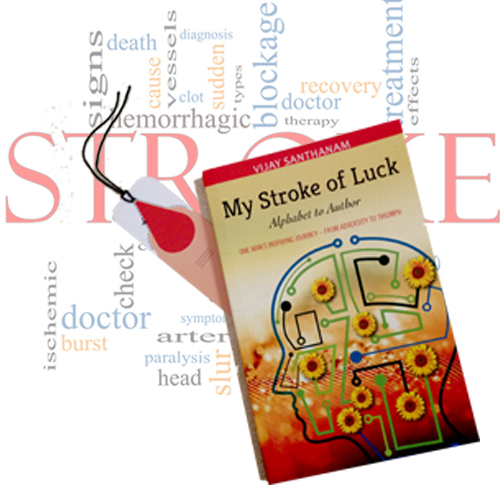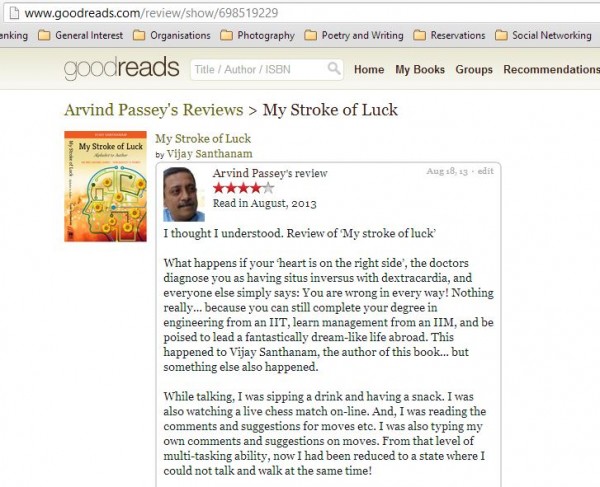What happens if your ‘heart is on the right side’, the doctors diagnose you as having situs inversus with dextracardia, and everyone else simply says: You are wrong in every way! Nothing really… because you can still complete your degree in engineering from an IIT, learn management from an IIM, and be poised to lead a fantastically dream-like life abroad. This happened to Vijay Santhanam, the author of this book… but something else also happened.
While talking, I was sipping a drink and having a snack. I was also watching a live chess match on-line. And, I was reading the comments and suggestions for moves etc. I was also typing my own comments and suggestions on moves. From that level of multi-tasking ability, now I had been reduced to a state where I could not talk and walk at the same time!
‘My stroke of luck’ isn’t another one of those novels that go on and on about some inane romance or try to tell us what happens in an IIT or IIM. This book dares to stare into the eyes of ‘stroke’ and tame it enough to take the bite out of it. I mean, we meet the writer himself in the pages as he tells us that he is ‘not advocating anyone to panic or live in fear all the time; but (I am) suggesting that everyone needs to listen to what the body and mind are saying.’ The book takes us through a four year journey that made him re-learn all he knew, including the position of a vowel in a word.
I remember once I was trying to write the word ‘shirt’ and believe me, ‘i’ was the fourth of the five vowels I tried!
No, this book isn’t the right one if all you are looking for is medical information on strokes. The author makes this clear right in the beginning and then tells us about his confusion, struggles, and seemingly minor triumphs that he came face-to-face with as a stroke patient. The observations he makes are relevant not just from a patient’s point-of-view, but I thought at a point that they would make sense to anyone in any position. He observes:
…we all have billions of neurons and we use only a fraction of these. Importantly, when a neuron dies, the rest around it try to learn to do what the dead cell was doing earlier.
As I read the sentence quoted above, I muttered, ‘The show must go on!’ Yes, it hints at the relevance of proactive learning, the superiority of ‘systems and processes’ in allowing any organisation to move on even in distressing times, the spirit to play until the last ball is bowled, and the ability to bounce back riding an alternative vehicle! Such pithy observations made me sit up and read on until the wee hours of the morning. I loved the way Vijay concluded that ‘even Kainaz (his wife), who understands the most about the effects on my stroke than anyone, doesn’t understand fully how my stroke has affected me, my daily life, my inabilities and the limitations and my anxieties and frustrations.’ But it isn’t just that ‘a stroke affects a patient’s body, mind and soul in ways it is hard for others to fathom’. So this is true even for the non-victims of any disease… we are all quite special and unique and rather enigmatic in our own way, aren’t we?
And it was then that I fully understood that only those who are affected with such a handicap can really understand their sensitivities, feelings, pain, and anguish – real or perceived.
It is always the insights in a book that matter more than a mere story or plot or theme… and seen from this perspective, the pages are indeed full of them. The author does take us deep into many aspects of stroke… and coming from a patient’s pen, they are like a soldier’s report of a vicious fight from the battle-front. Like the time when his wife, on gauging the seriousness of the attack, suggests that he be taken to a hospital:
‘Vijay, we are going to the hospital right now!’ she said, but I protested with an emphatic ‘No!’
It is interesting that this is one of the first words a child learns and it is the same monosyllable that a stroke-stricken patient who has lost his ability to speak could still use!
Or the strange ways in which the real world and the world inside the patient’s mind don’t seem to realise where the gap lies. The book does throw you into open fields of surreal thoughts and you, as a reader, have no choice but to wait and read for more…
I realised that neither could I name the city and country I was in, nor my home country. But, on the flip side, I fully understood important aspects and qualities of both countries. It was very strange – I ‘knew’ many things but one could argue that I did not know at all.
Courage and bravery aren’t the only benchmarks of triumphant struggle. The book made me sit up and salute the way admitting a fault too contributes in such victories. The author admits that ‘self-denial cost me precious time’ and that ‘I was not an angel before my stroke! Post-stroke, I find myself easily irritable, upset, and impatient – all pointing to a short temper’ are all realisations that do matter at different times.
The book is a veritable treasure for those looking for one-liners and other factoids that say much more than the number of words they are made up of. Thus when Vijay writes that ‘the confusion was only in communicating with others’ or tells us that ‘recently, I did read of a study that showed that vegetarians are slightly more prone to strokes…’ and that…
I thought to myself, ‘You are the doctor, but the goal is mine and the will power is mine, too.’
As a reader I thought I was completely justified in re-reading such sentences as a substitute for applause. By the time one reaches the end of this book, one does nod in agreement when Vijay tells us that ‘it is a positive attitude that triggers the virtual cycle of trying for more and managing to do more.’ The book doesn’t attempt to get into the quagmire of ‘why it happened’ because…
I could have been born to a slum dweller in one of the cities of the world or been a poor villager without formal education. And, I could have been the sole breadwinner of my impoverished family, who would have been starving from day two of my stroke, forget about medical care for me. If you think of the distribution of income in the world, the odds of this scenario is much higher than what I have been blessed with. If this is not luck, then what else is it?
This book, to my mind, goes on to promote and celebrate humility and teamwork… and this is what makes it invaluable.
Book Details:
Title: My Stroke of Luck
Author: Vijay Santhanam
Cover Design: Seema Sethi
Publisher: Hay House
ISBN: 978-93-81431-95-5
Price: Rs 299/- (in 2013)
The book was received as part of Reviewers Programme on The Tales Pensieve.
This review was also published on Goodreads:
Arvind Passey
19 August 2013











2 comments
Sridevi says:
Aug 20, 2013
I have read this book. Quite motivating.
Arvind Passey says:
Aug 20, 2013
Yes, the book is indeed worth buying and reading…